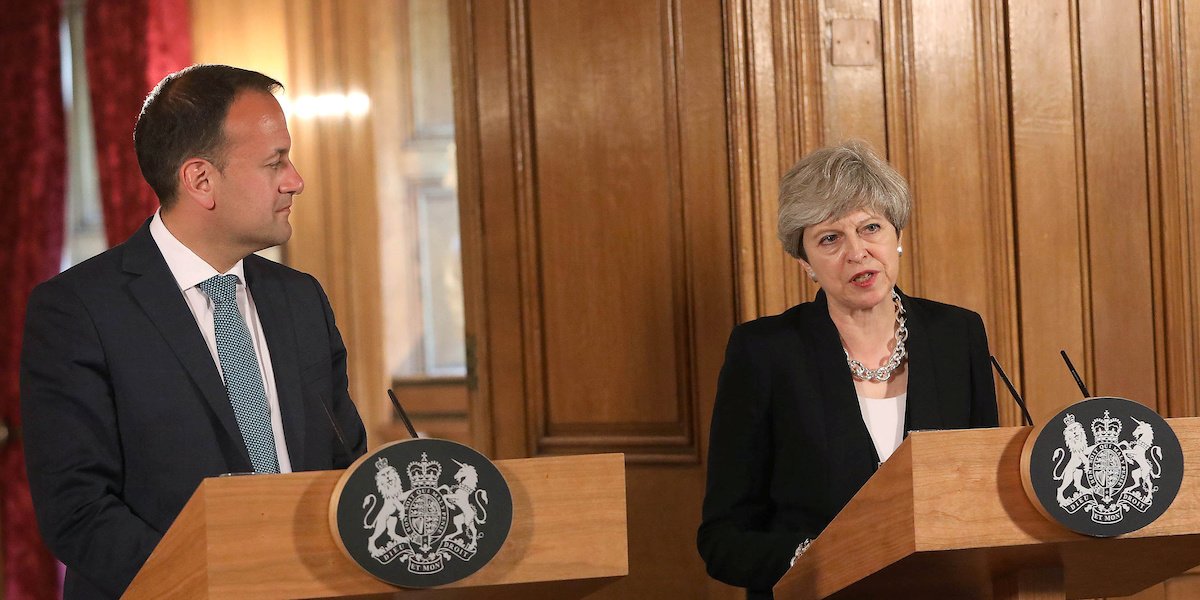 Irish President Leo Varadkar with UK Prime Minister Theresa May.REUTERS/Philip Toscano/Pool
Irish President Leo Varadkar with UK Prime Minister Theresa May.REUTERS/Philip Toscano/Pool
- EXCLUSIVE: The Irish government is worried that Brexit talks could “collapse at any moment”.
- A senior Irish minister said they feared negotiations could break down over the border issue in a private meeting with a prominent MP this month.
- “If this blows up over the next two months it will be over Ireland,” an EU negotiator was reported as saying.
- Theresa May refuses to budge on her policy to leave the customs union.
LONDON — There is renewed fear within the Irish government that Brexit talks could collapse over the UK government’s refusal to consider staying in a customs union with the European Union.
Senior figures in the Irish government said privately that they fear that Theresa May’s insistence on leaving the customs union will make a hard border impossible to avoid and lead to a complete break down in negotiations.
A high-ranking member of the Irish government said “talks could collapse at any moment” in a meeting with a prominent British MP this month, a source familiar with the meeting has told Business Insider.
The Irish government did not wish to comment when contacted by BI.
The EU’s chief Brexit negotiator, Michel Barnier, said on Friday that border checks between Northern Ireland and the Republic of Ireland are “unavoidable” if Britain decides to leave the customs union and single market.
“Once again it is important to tell the truth,” Barnier told journalists in Brussels.
“A UK decision to leave the single market and to leave the customs union would make border checks unavoidable.”
Last week, Prime Minister Theresa May May categorically ruled out Britain staying in either the current customs union or a new customs union with the EU after it leaves the bloc.
A spokesperson for the prime minister added this week that the government was instead looking at agreeing either a “highly streamlined customs arrangement” or “a new customs partnership” with the EU.
The statement followed days of senior Cabinet figures publicly clashing over the issue.
Last weekend the Home Secretary Amber Rudd told the BBC that the prime minister had an “open mind” about the issue. This was dismissed by the Housing Minister Dominic Raab, who told Sky News that: “I don’t think we’ll be in any form of customs union, at least as conceived in international trade practice.”
The customs union lets EU member states trade with each other without tariffs and barriers. The EU has repeatedly warned Britain that leaving the customs union will create a physical border between Northern Ireland and the Republic of Ireland. The UK government insists it can maintain an invisible border outside the customs union.
 The EU’s chief Brexit negotiator Michel BarnierFrancois Lenoir/Reuters
The EU’s chief Brexit negotiator Michel BarnierFrancois Lenoir/Reuters
EU figures share the Irish government’s concern over the border issue, according to recent reports.
“If this blows up over the next two months it will be over Ireland … That is the flashpoint,” a senior negotiator in Brussels told the Financial Times.
In December, British and EU negotiators reached an agreement on the first stage of Brexit talks which effectively delayed the Irish border question until the second stage of talks, which got underway this week.
Cabinet figures like Rudd and Chancellor Philip Hammond want to see Britain remain closely aligned to EU market and customs rules, in order to minimise disruption and increase the chances of avoiding a hard Irish border.
However, prominent ministers like Foreign Secretary Boris Johnson and Trade Secretary Liam Fox are putting May under pressure to make sure Britain diverges from EU regulations after it has left.
The prime minister also has the Democratic Unionist Party to keep on the side.
The pro-union party, led by Arlene Foster, has said it will not support any deal which sees Northern Ireland drift away from the rest of the UK after Brexit as a result of regulatory alignment with the EU. One possible position for the border — opposed by the DUP — is to keep the Irish border open and to relocate a hard border between Northern Ireland and the rest of the UK, in the Irish Sea. The DUP opposes that because it would create a de facto united Ireland outside the regular borders of the UK.
Eloise Todd, CEO of anti-Brexit group Best For Britain, said the government must “come clean” about what its policy would mean for the Irish border.
“The Irish border is the issue that could sink Brexit. The border has to either be in the Irish Sea, or cut through Ireland. It’s either one of those two or the government forces Ireland to leave with us,” Todd told BI.
“The sooner the government comes clean about what’s really possible the better. The truth is either the UK government betrays Ireland and the fragile peace in Northern Ireland by cutting through the north/south divide or the government jettisons the DUP and cuts up the UK.
“The lengths to which the government will go to in order to cover up the truth are astonishing: we call on Taoiseach Varadkar to say it as it is and help Britain get to the wake up call it needs. Brexit isn’t working, we need to stay and lead in Europe.”













